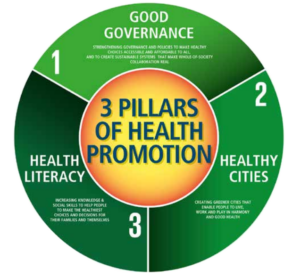By Maanyaa Jain
The Shanghai Declaration
Shanghai is an iconic site of not only health education promotion but also implementation. The 9th Global Conference on Health Promotion, held in Shanghai from November 21 to 24, 2016, marked a significant milestone in the integration of health promotion within the framework of the United Nations’ 2030 Agenda for Sustainable Development. This pivotal event brought together over 1,260 high-level political stakeholders and commemorated 30 years since the Ottawa Charter, highlighting the evolving global landscape and the emerging challenges posed by climate change and urbanization.
At the heart of the conference was the Shanghai Declaration, a document that reaffirmed health as a universal right and emphasized its essential role in sustainable development. The declaration focused on three main areas: Healthy Cities, Good Governance, and Health Literacy. It positioned health promotion as a fundamental component across all 17 Sustainable Development Goals (SDGs), expanding its scope beyond noncommunicable diseases to also address infectious disease outbreaks and urban development. This comprehensive approach underscored the necessity for bold political action across various sectors to enhance health outcomes.

The conference encouraged the global community to adopt the “#ChooseHealth” mantra, advocating for inclusive health promotion strategies that leave no one behind. It highlighted successful examples of multi-sectoral actions, such as tobacco control legislation and the taxation of sugar-sweetened beverages, demonstrating the effectiveness of collaborative efforts in promoting health.
Waste Management as Health Promotion

Workers sort waste in front of trash bins in Shanghai
Fast-forward to July 2019, when Shanghai initiated significant reforms in waste management, aligning with the principles outlined in the Shanghai Declaration. These reforms mandated residents to sort their waste into four distinct categories: recyclables, hazardous waste, wet (organic) waste, and dry (non-recyclable) waste. This initiative was designed to tackle the city’s growing waste problem while promoting environmental sustainability, reflecting the broader goals of good governance and health literacy established during the 2016 conference.
To support these reforms, the Shanghai government launched extensive public education campaigns aimed at informing citizens about proper waste sorting practices and the importance of environmental responsibility. The initiative also included enhancements to the city’s waste collection infrastructure, such as the installation of more recycling bins and the establishment of processing facilities to manage sorted waste effectively.
Overall, Shanghai’s waste management reforms represent a critical step towards creating a more sustainable urban environment. They illustrate the city’s commitment to integrating health promotion with environmental responsibility, embodying the spirit of the Shanghai Declaration and its emphasis on collaborative action for sustainable development. Waste management acts as an important symbol of Shanghai’s ever-present dedication to health promotion through policy and lifestyle changes.
Learn more:
World Health Organization. (2017). Promoting health in the SDGs: Report on the 9th Global Conference for Health Promotion: All for health, health for all, 21–24 November 2016. https://www.who.int/publications/i/item/promoting-health-in-the-sdgs
Ministry of Housing and Urban-Rural Development of the People’s Republic of China. (2019, March 12). 上海推进生活垃圾分类减量 推动建成全程分类体. Retrieved from https://www.mohurd.gov.cn/xinwen/dfxx/201903/20190312_239720.html
Hero image © China Daily News